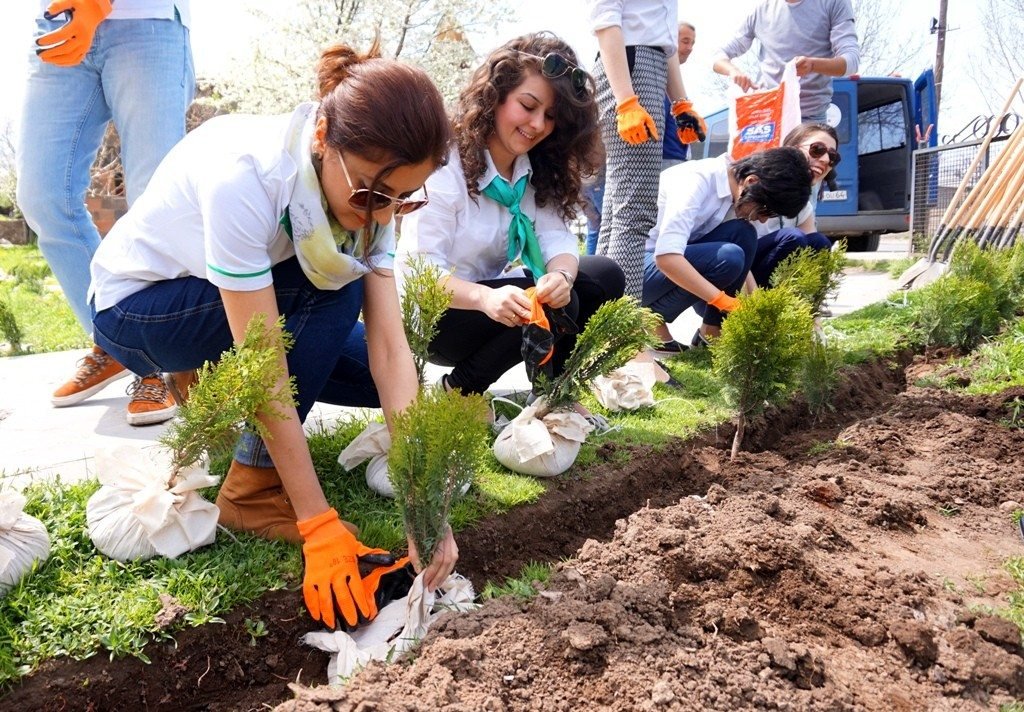YEREVAN—Armenia Tree Project (ATP) has produced many stories of transformations: historic monasteries returned to their original scenic glory, soil erosion halted, public parks and schoolyards greened, creating pleasant environments for children to play in and feel connected to nature.

The Community Tree Planting (CTP) program is at the heart of ATP’s mission. Launched in 1994 as the organization’s flagship project, the CTP program pioneered the effort to reverse the loss of trees in Armenia. Such an undertaking during those tumultuous years was a challenge. Twenty years on, however, with more than 4.7 million trees planted and entire communities revitalized, ATP demonstrates how crisis can create change.
One of ATP’s goals is to plant trees in every city, town, and village of Armenia. “Currently, we’ve planted trees at more than 1,025 sites all over Armenia and Artsakh,” explains CTP manager Arthur Harutyunyan. “This represents plantings in 332 towns and villages, out of a total of 914 throughout the country. So we’re more than one-third of the way toward our goal of reaching every community with trees. With continuing support and a steady focus, we are confident that we will be successful in creating a green future for Armenia.”
The Living Century Initiative, ATP’s latest campaign, was launched for the Centennial of the Armenian Genocide. Ten new community forests will be established in northern Armenia corresponding to regions of historic Armenia that were decimated in the genocide. The effort is a close collaboration between ATP’s forestry and CTP divisions.
The trees planted by the CTP program in spring and fall come mainly from nurseries in Karin and Khachpar, which produce approximately 60,000 fruit and decorative trees each year. The trees are requested by local organizations and community leaders, who contact Harutyunyan on a daily basis. “I receive a constant stream of inquiries for our trees, which is encouraging,” notes Harutyunyan. “We’re glad to see that the public is interested in trees and greening their sites. Eighty percent of our plantings are initiated by the local community.”
After receiving a request, ATP schedules a visit to the planting site for an evaluation. Several criteria are investigated to determine whether a community is ready for a tree-planting project. This includes the motivation of the local community to plant and care for the trees, and technical aspects like the availability of irrigation water, fencing if needed, and good soil quality. If these requirements are satisfied to ensure a high survival rate, ATP will provide a small number of trees for a trial period. “There needs to be a 70 percent survival rate to receive the remainder of the trees needed or requested at a site,” emphasizes Harutyunyan, who proudly adds that some sites have a 90-95 percent survival rate.
“There is a high level of demand for our trees, and also solid results in terms of tree survival,” says Harutyunyan. “At the same time, there may be wait times for prospective participants so communities should contact us well ahead of time for us to evaluate the planting site and allocate trees from our nurseries.”
“We receive a great deal of support from the diaspora in more than a dozen countries with a major focus in the United States,” says Harutyunyan. “We also have a group of large governmental and institutional donors who have funded major projects.”
Several Armenia-based corporations plant with ATP as part of their Corporate Social Responsibility programs. Companies such as Asian Development Bank, Byblos Bank, and Synopsis have sponsored plantings as part of their employee engagement and community relations programs, scheduling outdoor planting days with ATP for employees and their families.
“We look back on two decades of success with pride, and we look forward to continued efforts as part of the Living Century Initiative,” concludes Harutyunyan. “We hope this initiative for the Genocide Centennial will become a global, grassroots effort to plant for future generations in Armenia.”
Emil Minas is a volunteer with ATP.



Be the first to comment